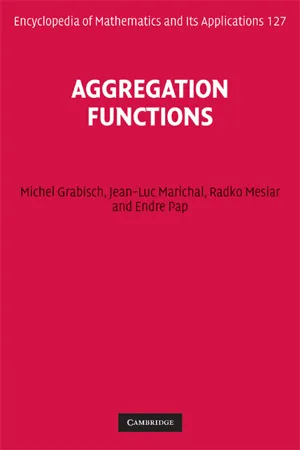
- English
- PDF
- Available on iOS & Android
Aggregation Functions
About this book
Aggregation is the process of combining several numerical values into a single representative value, and an aggregation function performs this operation. These functions arise wherever aggregating information is important: applied and pure mathematics (probability, statistics, decision theory, functional equations), operations research, computer science, and many applied fields (economics and finance, pattern recognition and image processing, data fusion, etc.). This is a comprehensive, rigorous and self-contained exposition of aggregation functions. Classes of aggregation functions covered include triangular norms and conorms, copulas, means and averages, and those based on nonadditive integrals. The properties of each method, as well as their interpretation and analysis, are studied in depth, together with construction methods and practical identification methods. Special attention is given to the nature of scales on which values to be aggregated are defined (ordinal, interval, ratio, bipolar). It is an ideal introduction for graduate students and a unique resource for researchers.
Tools to learn more effectively

Saving Books

Keyword Search

Annotating Text

Listen to it instead
Information
Table of contents
- Cover
- Half Title
- Title Page
- Copyright
- Dedication
- Contents
- List of figures
- List of tables
- Preface
- 1. Introduction
- 2 Properties for aggregation
- 3 Conjunctive and disjunctive aggregation functions
- 4 Means and averages
- 5 Aggregation functions based on nonadditive integrals
- 6 Construction methods
- 7 Aggregation on specific scale types
- 8 Aggregation on ordinal scales
- 9 Aggregation on bipolar scales
- 10 Behavioral analysis of aggregation functions
- 11 Identification of aggregation functions
- AppendixA: Aggregation of infinitely many arguments
- Appendix B: Examples and applications
- List of symbols
- References
- Index
Frequently asked questions
- Essential is ideal for learners and professionals who enjoy exploring a wide range of subjects. Access the Essential Library with 800,000+ trusted titles and best-sellers across business, personal growth, and the humanities. Includes unlimited reading time and Standard Read Aloud voice.
- Complete: Perfect for advanced learners and researchers needing full, unrestricted access. Unlock 1.4M+ books across hundreds of subjects, including academic and specialized titles. The Complete Plan also includes advanced features like Premium Read Aloud and Research Assistant.
Please note we cannot support devices running on iOS 13 and Android 7 or earlier. Learn more about using the app